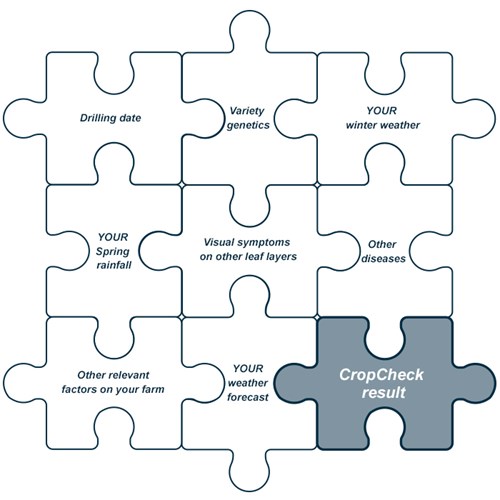CropCheck
qPCR Leaf Sampling Service

qPCR Leaf Sampling Service

Another layer of data to make better-informed disease control decisions. Bayer has teamed up with NIAB to develop qPCR leaf testing to check for latent Septoria and yellow rust in winter wheat crops. Results are normally returned within 48 hours of samples arriving at the NIAB laboratory and with the convenience of the CropCheck scoring system, the service provides a good steer on the phase of infection of the leaves sampled.
CropCheck is there to provide further insight. Creating a protective disease control strategy across the farm can be challenging, made more difficult by continuing weather volatility. All too often disease severity only becomes apparent when symptoms express themselves, by which time it can be too late. Adding CropCheck results to other decision factors such as variety rating, drilling date, weather and site fertility can only help in evaluating disease risk and appropriate response.
Please note that the CropCheck service is not available for the 2025 season but you can register your interest with your local Bayer Commercial Technical Manager. Contact your local Technical Manager here.
CropCheck involves sampling a set of leaves from your crop and sending it to our laboratory partner, NIAB, where qPCR is carried out on your leaf sample. By identifying and quantifying disease before symptoms are visible, this gives you a new layer of information to use alongside other agronomic factors to help you better inform and adapt your future fungicide decisions.
|
|
A CropCheck result is a single piece of information relevant to one leaf layer, at a singe point in time. Therefore, in order to make an informed fungicide decision it needs to be considered in the context of your whole agronomic scenario.
 |
With limited curative fungicide activity there is no longer a fallback position. If Septoria or yellow rust becomes established in the upper canopy then it is likely to result in a loss of green leaf area and ultimately yield, which can be significant in severe situations.
We also have to be mindful of our fungicide chemistry. Fungicides are designed to be used as protectants and exposing them to established disease is likely to hasten the onset of resistance.